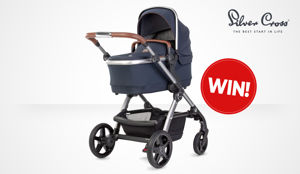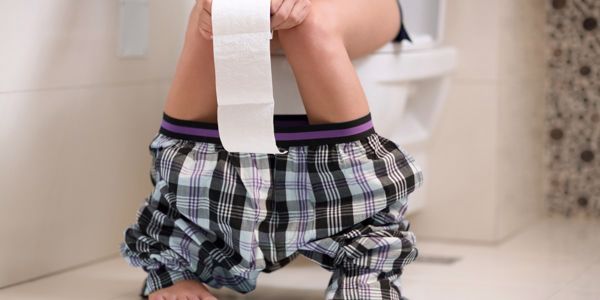So, you’ve had a baby. Or two. Or three in my case. That will certainly do it! We’re talking about bladder weakness of course. It’s all very well saying ‘Don’t make me laugh too much, I’ll wet myself!’
I don’t know about you, but I want to laugh so hard and not worry about changing my knickers afterwards.
What about those trampoline parks my kids' love, plus the great big one in my back garden. I want to be a big kid and jump away for an hour with them, without worrying if my incontinence pad can take it. I’d like to jump around in a Zumba class and wear tight gym leggings.
We all have a joke about never trampolining again, but should we just wear pads and accept it as part of the inevitable after having children? FYI if you had c-sections only, you aren’t immune. Age and pregnancy itself can have an impact on your pelvic floor. I don’t think we should just accept it.
So, when should we get help?
Are you experiencing any leaks of urine during the day? Leak when you laugh? Cough, sneeze, jump? Then you need help.
Well, the first thing you can do is help yourself. Groan, I know, but there’s no getting away from it. Pelvic floor exercises, Kegels, squeezes, call them what you like but they do help with the most common forms of urinary incontinence. I know saying urinary incontinence isn’t as sexy or funny as ‘oops moments,’ but it is what it is.
I thought I was doing my pelvic floor exercises OK, but really, I just wasn’t doing them right. It took a referral to a bladder weakness specialist nurse to realise my pelvic floor was rubbish. Once she showed me how to really do them, things improved. I was convinced I’d need surgery when all I needed was to get it right! I thought you had to squeeze more at the front where the urethra is, but actually, it’s more in the vagina that you need to squeeze and lift. It’s also a mixture of quick squeezes and squeeze and holds that helps. Try doing 10 squeezes and holds for as long as you can, followed by 10 quick squeezes three times a day and you might manage to do them twice a day.
The usual way people tell you is to imagine you’re stopping the urine flow, but I think that’s not always that helpful, and trying to stop the flow too much can actually damage the bladder. I find it easier to imagine you have something like a small ball in your vagina and you have to keep it from falling out. There are gizmos and gadgets that you can get to help the sensation, I’m a fan of the Perifit gadget, which talks to an app on your phone and you can play games with your vagina. Seriously. Why not have a bit of fun whilst you’re toning your lady bits? Anyway, you don’t need anything really, you can just use your imagination. It’s also important to know how to relax the muscles down again.
If you’ve been religiously doing your pelvic floors and you’re still experiencing leaks, it’s important to make a note of when those leaks happen, because then you can identify the type of incontinence you have. Do you:
- Leak when you cough, laugh, sneeze?
- Leak when you exercise?
- Leak when you get home and put the key in the door?
If you leak when you cough and exercise, it’s more likely you have stress incontinence. If you leak when you need the toilet (not bursting) but when you get home and put the key in the door some urine leaks out, that is urge incontinence.
Once you’re armed with some facts about your particular issue, go to the GP and ask to be referred to incontinence services. Don’t be embarrassed, the health professionals just want what’s best for you, so just go for it. Even me, a health professional myself, I waited far too long. Once I’d gone, I discovered I have a small prolapse of my bladder into the vaginal wall, which can be corrected with pelvic floor exercises. I’m so glad I went. I’d got to the point where it was affecting pretty much every area of my life. I still wear panty liners every day, but some days there’s pretty much nothing on there, and I feel far more confident in my daily life. Here are some tips, apart from pelvic floor exercises to help reduce leaks:
- Ditch the caffeine
- Reduce alcohol consumption
- Empty your bladder frequently
- Ensure you have emptied properly, you may need to stand up and try emptying again, or lean forward to completely empty
- Drink plenty of water
- Give up smoking
- Before you need to do any lifting, tighten your pelvic floor muscles
- If you are overweight, try losing some weight
- Avoid constipation
- Avoid or reduce citrus fruits that can irritate the bladder
I know I’ve just named two of the famous Mum crutches, caffeine and alcohol, you don’t have to quit completely. Before I went to the nurse specialist, I was drinking lots of diet coke and at least one glass of wine per night plus a cup of tea at least once a day. Afterwards, I switched to caffeine-free diet coke and tea and reduced my wine consumption. Just doing that helped me a little. I don’t miss the caffeine, I’m still as tired as I was before, no change!
Whether you have the odd leak, or you need to wear pads of some sort every day, just make that appointment, or start seriously doing your pelvic floor exercises. You don’t have to just get on with it and accept the inevitable.







